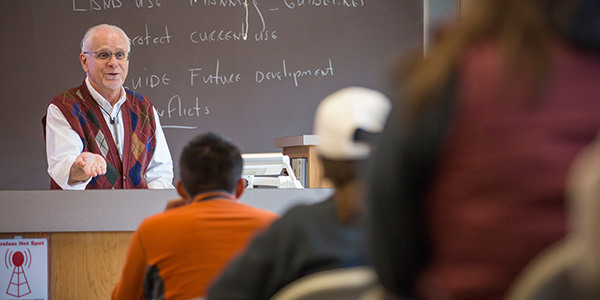
Creating the future, teaching to serve
Story by Tracy Schlater
Image by Christopher Gannon
Lee Burras sets his Diet Pepsi on the podium and grabs a piece of chalk off the ledge. Class is about to begin.
Burras’ classroom is upbeat and adversarial; he encourages his students to challenge him as much as he challenges them. In order to keep students engaged he uses the chalkboard.
“I want students engaged,” says Burras. “I want whatever I’m talking about to come to life in front of them. I can’t make that happen with a Power Point presentation.”
Burras’ passion is infectious, not just for soils but also for life and for learning. His classes are some of the most sought after in the Department of Agronomy.
“Growing up, I had no idea a normal person could be a professor,” says Burras, professor of agronomy. “What I did know was that I liked science.”
A U.S. Navy ROTC scholarship changed his life by bringing him to Iowa State University from Renwick, Iowa, as an “undecided engineering” major. His path shifted when Peter Peterson, a plant breeder in the Department of Agronomy, hired him to work in the field the summer after his freshman year. Burras (’81 agronomy, ’84 MS soil science) says he found his passion when he was invited to be a teaching assistant for Wayne Scholtes during his senior year.
“Working with Peter made me want to be a scientist. Wayne made me want to be a teacher,” says Burras. “I believe humans have a need to serve. With teaching, I feel a clear connection to service. And, I am a lifelong learner. I want to learn as much from my students as they learn from me.”
Upon accepting his first position at the University of Louisiana in Lafayette he was the only soil expert on campus. Limited budgets taught him to be efficient. He quickly learned quality content in the classroom was the way to make an impact on students.
“I had to make the entire wheel work, rather than simply serve as a cog in the wheel,” he says.
Burras returned to Iowa State University in 1995 to help create and teach the environmental science program. His soils classes at Iowa State fill quickly and students often ask to be added to a wait list.
“Dr. Burras believes the only way to predict the future is to create it, and he motivates every single student to do that in their own unique way,” says Jacqueline Klindt, senior in agricultural business.
During his 22 years at Iowa State Burras has taught 15 different courses. He often teaches three to four classes per semester. During the summer, he can be found on the shores of West Okoboji Lake in northwest Iowa teaching hands-on soils classes at Lakeside Lab. The Iowa Lakeside Laboratory Regents Resource Center is owned by the state of Iowa and operated through the Board of Regents. It serves as a field station and community resource to support scientific education, research and outreach programs.
“Dr. Burras inspires students to step out of their comfort zone to experience and appreciate diverse cultures and agriculture from a global perspective, resulting in students developing a stronger interest in studying abroad,” says Klindt who has studied abroad with Burras twice.
Burras co-leads at least one international study abroad course each year to places like Costa Rica, Ecuador, Uruguay, Uganda and France.
“I believe strongly in the perspective studying abroad provides,” says Burras. “Seeing agriculture in practice elsewhere makes students question how things are done here, ultimately helping them become better agronomists.”
Burras received the Distinguished Undergraduate Teaching Award from Iowa State University in 2010 followed by the Excellence in University Teaching Award from the USDA in 2011. His list of awards also includes resident education awards from the Soil Science Society of America and the American Society of Agronomy and the Iowa State University Excellence in Academic Advising Award.
He may teach his students about soil, but they walk away with a better understanding of the world around them.
“Dr. Burras allows us to apply accumulated knowledge to solve issues faced all around the world, and that may arise in our careers after graduation,” says Chance Mayland, junior in agronomy. “Along with implementing knowledge, looking at the global spectrum gives us a view on how agriculture differs around the world.”



